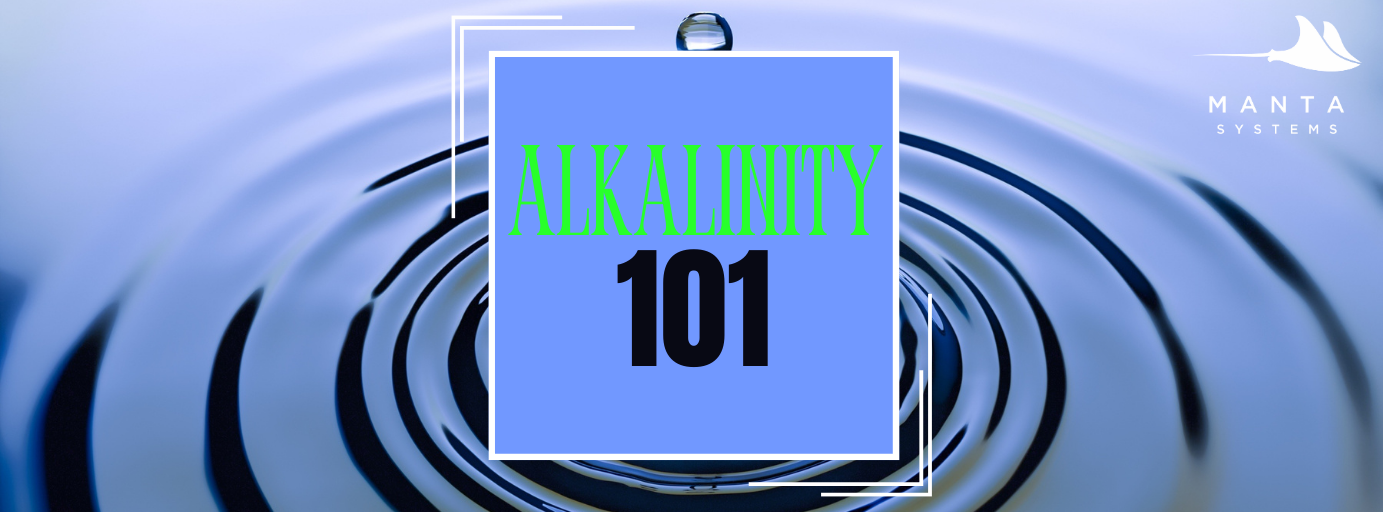
𝐔𝐧𝐝𝐞𝐫𝐬𝐭𝐚𝐧𝐝𝐢𝐧𝐠 𝐭𝐡𝐞 𝐈𝐦𝐩𝐨𝐫𝐭𝐚𝐧𝐜𝐞 𝐨𝐟 𝐀𝐥𝐤𝐚𝐥𝐢𝐧𝐢𝐭𝐲:
𝐀 𝐊𝐞𝐲 𝐭𝐨 𝐓𝐡𝐫𝐢𝐯𝐢𝐧𝐠 𝐑𝐞𝐞𝐟 𝐓𝐚𝐧𝐤𝐬
Updated: 2/12/25
Introduction
Alkalinity often takes a backseat to parameters like calcium and salinity, but make no mistake—it’s the backbone of a thriving reef tank. Without proper alkalinity, coral growth slows, pH becomes unstable, and your reef turns into a delicate house of cards waiting to collapse.
This guide dives into everything you need to know about alkalinity—what it is, why it’s important, how to measure it, and how to troubleshoot common issues. By the end, you’ll have a rock-solid understanding of how to keep your reef stable and thriving.
What Is Alkalinity?
Alkalinity, also called carbonate hardness (KH), is a measure of the water’s ability to neutralize acids and resist pH swings. It is made up of bicarbonate (HCO₃⁻) and carbonate (CO₃²⁻) ions, both of which play a key role in coral skeletal formation.
Think of alkalinity as your reef’s shock absorber—it stabilizes pH levels and ensures your corals have the necessary carbonates to grow their skeletons.
Why Alkalinity Is Crucial for Corals
-
Coral Skeletal Growth – Corals extract calcium and carbonate from the water to form calcium carbonate (CaCO₃), which builds their skeletons.
-
pH Stability – Without proper alkalinity, pH can fluctuate dangerously, leading to coral stress and potential death.
-
Water Chemistry Balance – Alkalinity, calcium, and magnesium work together—imbalances can cause precipitation, slowing coral growth.
Ideal Alkalinity Levels in a Reef Tank
| Parameter | Ideal Range |
|---|---|
| Alkalinity (dKH) | 7 - 11 dKH |
| Alkalinity (meq/L) | 2.5 - 4.0 meq/L |
Keeping alkalinity within this range provides stability while ensuring corals have the necessary carbonate ions for skeletal growth.
How Alkalinity Affects pH in Saltwater Aquariums
Alkalinity and pH are closely linked in reef aquariums, and maintaining the right balance is critical for coral health and overall tank stability. Alkalinity acts as a buffer—it helps prevent drastic swings in pH, which can stress or even kill marine life.
The Role of Alkalinity in pH Stability
- pH Basics: pH measures how acidic or basic your water is. In reef tanks, an optimal pH range is 7.8–8.4, with 8.1–8.3 being ideal.
- Alkalinity as a Buffer: Alkalinity is primarily composed of bicarbonate (HCO₃⁻) and carbonate (CO₃²⁻) ions, which neutralize acids and resist pH swings. Without adequate alkalinity, pH can fluctuate dangerously.
- How It Works:
- If acids build up (from fish respiration, waste, or biological processes), alkalinity neutralizes them, keeping pH stable.
- If alkalinity is too low, these acids cause pH to drop, leading to stress in corals, fish, and beneficial bacteria.
- If alkalinity is too high, it can push pH too high, leading to calcium precipitation and imbalances in other parameters.
What Happens When Alkalinity Drops?
- pH Becomes Unstable – A tank with low alkalinity will experience pH swings, especially between night and day.
- Corals Struggle to Grow – Corals rely on bicarbonate to form their calcium carbonate skeletons. Without enough alkalinity, skeletal growth slows down.
- Increased Risk of Acidosis – Low alkalinity can lead to an accumulation of carbon dioxide (CO₂), which acidifies the water and further lowers pH.
What Happens When Alkalinity Is Too High?
- pH Spikes – Excess alkalinity can push pH beyond safe levels, stressing livestock.
- Calcium Precipitation – When alkalinity rises too much, calcium can precipitate out of solution, forming white, chalky deposits and depleting essential minerals.
- Corals Become Irritated – Some corals may retract polyps or show signs of stress in excessively high alkalinity conditions.
Balancing Alkalinity and pH
To maintain stable pH:
- Keep Alkalinity in the Optimal Range: 7–11 dKH (2.5–4.0 meq/L)
- Aerate Your Tank: Proper gas exchange helps maintain pH by preventing CO₂ buildup.
- Monitor Calcium and Magnesium Levels: These elements work together with alkalinity; imbalance can disrupt pH stability.
- Avoid Rapid Adjustments: Gradual dosing of alkalinity supplements prevents pH shocks.
Tamara’s Pro Tip: If your pH is consistently low despite good alkalinity, try improving gas exchange—point powerheads toward the surface, increase ventilation around the tank, or run an airline from your protein skimmer outside to pull in fresh air.
Measuring Alkalinity in Your Reef Tank
Regular testing is critical. Small changes matter, and staying on top of alkalinity levels can prevent major disasters.
Best Ways to Test Alkalinity:
-
Titration Test Kits: Affordable and accurate, but requires careful color interpretation.
-
Hanna Alkalinity Checker: A digital meter that gives an instant numerical reading—no color matching required.
-
Aquarium Controllers: Monitors alkalinity automatically but comes at a premium price.
Tamara’s Pro Tip: If you’re getting inconsistent readings, rinse your test vials with tank water before each test. Leftover residue from previous tests can throw off your results!
Signs of Alkalinity Imbalance
Low Alkalinity Signs (Below 7 dKH)
- Slowed Coral Growth – Corals rely on carbonate ions to build their skeletons.
- pH Fluctuations – A weak buffering system means your pH swings more easily.
- Increased Coral Stress – Corals may retract polyps and appear unhealthy.
High Alkalinity Signs (Above 11 dKH)
- Calcium Precipitation – White, chalky buildup on equipment and rocks.
- Cloudy Water – Excess calcium carbonate can precipitate and reduce water clarity.
- Coral Irritation – Some corals struggle with elevated alkalinity, showing poor polyp extension.
Tamara’s Pro Tip: If your alkalinity is dropping fast, check your magnesium levels. Low magnesium allows alkalinity to fluctuate more than it should!
Maintaining Stable Alkalinity in a Reef Tank
Alkalinity plays a critical role in coral growth, skeletal development, and overall reef stability. Proper maintenance prevents fluctuations that can stress corals and lead to issues like tissue recession or polyp bailout. Below is a more detailed breakdown of the best practices for managing alkalinity in a saltwater aquarium.
1. Regular Water Changes
Water changes not only remove excess nutrients and replenish trace elements but also help stabilize alkalinity.
- Use a High-Quality Salt Mix
Different salt brands have varying alkalinity levels. Some mixes are designed for ultra-low nutrient systems (ULNS) with lower alkalinity, while others are formulated for high-demand SPS tanks. Choose a mix that aligns with your tank's needs. - Avoid Excessively High dKH Salts If Not Needed
Some commercial salt mixes have an alkalinity of 12+ dKH. If your system runs at 7-9 dKH, using these salts without adjustment can lead to large fluctuations. If you use a high-dKH salt, perform smaller, more frequent water changes to prevent drastic shifts.
2. Alkalinity Supplements
If alkalinity drops below the desired range (typically 7-9 dKH for most reef tanks), supplementation may be necessary.
-
Sodium Bicarbonate (Baking Soda)
- Raises alkalinity without significantly affecting pH.
- Best for tanks where pH is already on the higher side (8.3 or above).
- Can be dosed directly but should be dissolved in RO/DI water first for better distribution.
-
Sodium Carbonate (Soda Ash)
- Raises both alkalinity and pH.
- Best suited for tanks with lower pH (below 8.1) that need a slight boost.
- More potent than baking soda, so dosing should be done gradually.
How to Dose:
- Always dissolve the supplement in RO/DI water before adding to the tank.
- Dose in a high-flow area, such as the sump, to ensure even distribution.
- Start with a conservative dose and test alkalinity after a few hours before making further adjustments.
3. Balanced Two-Part Dosing
Reef tanks with corals consuming both calcium and alkalinity at high rates benefit from two-part dosing systems.
-
What is Two-Part Dosing?
This method involves adding equal parts of:- Part 1: Calcium chloride (to maintain calcium levels).
- Part 2: Sodium carbonate or bicarbonate (to maintain alkalinity).
- Some systems include Part 3: Magnesium, as magnesium helps prevent precipitation of calcium and alkalinity.
-
Benefits of Two-Part Dosing:
- Provides a balanced way to maintain calcium and alkalinity.
- Prevents swings that could harm corals.
- Ideal for tanks with stony corals (LPS and SPS) that rapidly deplete alkalinity.
-
Dosing Tips:
- Dose small amounts multiple times per day instead of a single large dose.
- Use a dosing pump for consistency.
- Always test alkalinity and calcium levels regularly to ensure balance.
4. Monitor and Adjust Slowly
Rapid alkalinity changes can shock corals, causing bleaching, tissue loss, or polyp bailout.
-
Safe Adjustment Rate:
- Never increase alkalinity by more than 1 dKH per day.
- If alkalinity is extremely low (e.g., 5 dKH), bring it up over several days instead of all at once.
-
Testing Frequency:
- Test alkalinity daily when making adjustments.
- Once stable, weekly testing is usually sufficient.
- If using a dosing system, occasional cross-checking with a second test kit or digital tester is a good practice.
Troubleshooting Alkalinity Issues
1. Problem: Alkalinity Drops Too Fast
-
- Causes: Overactive coral growth, weak buffering system, or high organic waste.
- Fix: Increase dosing frequency and check magnesium levels.
2. Problem: Alkalinity Is Too High
-
- Causes: Overdosing alkalinity supplements or high-alkalinity salt mix.
- Fix: Stop dosing and let corals consume excess alkalinity naturally.
3. Problem: Test Results Are Inconsistent
-
- Causes: Old test kits, user error, or contaminated test vials.
- Fix: Use fresh test kits, rinse vials thoroughly, and cross-check with a different brand.
Myths About Alkalinity
1. “You only need to test when things go wrong.”
-
- Reality: Regular testing helps prevent problems before they happen.
2. “Clear water means good alkalinity levels.”
-
- Reality: Alkalinity imbalances can exist even if your tank looks pristine.
3. “Higher alkalinity means faster coral growth.”
-
- Reality: Too high alkalinity can lead to calcium precipitation and coral stress.
FAQs About Alkalinity
1. Q: How often should I test alkalinity?
A: At least 2-3 times a week in established tanks; daily in new tanks or if you’re adjusting dosing.
2. Q: Can I raise alkalinity too quickly?
A: Yes! Alkalinity swings can stress corals. Increase it gradually—no more than 1 dKH per day.
3. Q: My alkalinity is low, but calcium and magnesium are fine. What should I do?
A: Your tank is consuming alkalinity faster than calcium. Dose alkalinity supplements separately.
Conclusion
Mastering alkalinity is one of the most important skills for a successful reef tank. By keeping alkalinity within stable parameters, you ensure strong coral growth, prevent pH swings, and maintain a thriving system.
Regular testing, gradual adjustments, and a balanced approach will keep your reef healthy and stress-free.
Happy Reefing!
References:
-
Calfo, Anthony, and Robert Fenner. Reef Invertebrates: An Essential Guide to Selection, Care, and Compatibility. Reading Trees Publications, 2003.
-
Sprung, Julian, and J. Charles Delbeek. The Reef Aquarium: Volume Three: Science, Art, and Technology. Ricordea Publishing, 2005.
-
Shimek, Ronald L. The Coral Reef Aquarium: An Owner’s Guide to a Happy Healthy Fish. TFH Publications, 2002.
-
“Alkalinity in the Reef Aquarium.” Reefkeeping Magazine, vol. 12, no. 4, 2013, www.reefkeeping.com/issues/2004-05/rhf/.
-
Borneman, Eric H. Aquarium Corals: Selection, Husbandry, and Natural History. TFH Publications, 2001.
